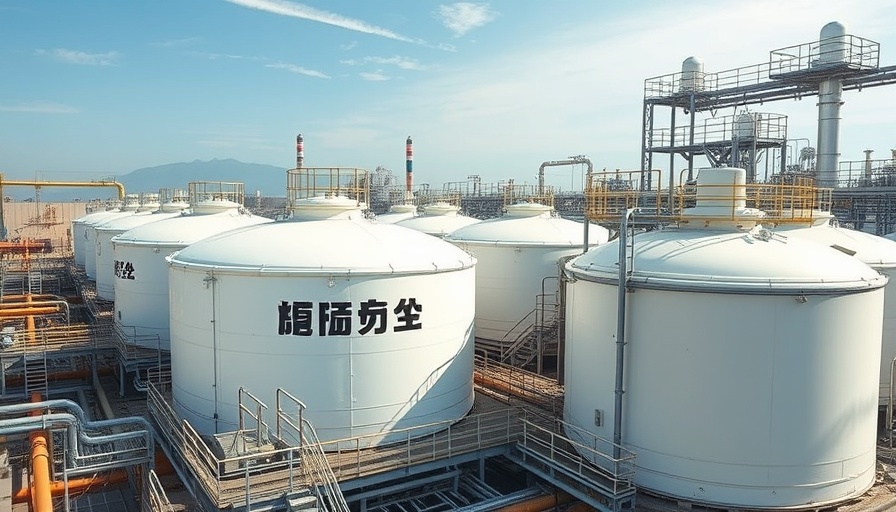
China's LNG Imports Halt: A Deepening Trade Rift
In a significant turn of events, China's imports of liquefied natural gas (LNG) from the United States have ceased entirely for over ten weeks. This standstill is not merely a temporary hiccup; it reflects deeper tensions in the ongoing Sino-American trade war, extending its ramifications into the energy sector. Following the arrival of a 69,000-ton LNG tanker from Corpus Christi, Texas, in early February, China has not received any additional shipments of U.S. gas.
The situation escalated when China imposed a 15% tariff on U.S. LNG on February 10, which has since ballooned to 49%. As a result, U.S. gas has become economically unfeasible for Chinese buyers. The halt in LNG imports is reminiscent of a similar block that occurred during President Donald Trump’s administration, emphasizing how geopolitical drama affects global energy dynamics.
Analyzing the Impact of Tariffs on Energy Trade
The introduction and escalation of tariffs has far-reaching consequences not just for U.S. energy exporters but also for the complex relationship between China and its energy providers. From being reliant on U.S. LNG, the import landscape has shifted, with Chinese entities now preferring to redirect their energy interests to more favorable suppliers, particularly Russia. The current scenario hints at a potential re-alignment in global energy trading patterns, raising concerns about the viability of multi-billion-dollar LNG infrastructure projects under development in the United States and Mexico.
A Shift Towards Russian LNG Purchases
China has looked towards strengthening its energy ties with Russia, whose LNG exports have increased at a breakneck pace. According to Zhang Hanhui, China’s ambassador to Russia, there is noticeable interest from various buyers in China seeking to establish contacts with Russian suppliers. This shift comes amid unfavorable tariffs on U.S. LNG, further solidifying Russia’s position as a crucial player in the energy market for Beijing.
Long-Term Contracts and Their Woes
Despite these troubling developments, Chinese firms, including PetroChina and Sinopec, have signed numerous long-term contracts to procure U.S. LNG up to 2049. As energy experts note, these contracts were critical for launching massive LNG projects in the U.S., but the terms may soon require renegotiation due to the elevating costs associated with tariffs and inflation. This places developers in a challenging position where operational viability and international relations are entangled in a web of economic complexities.
The Strategic Shift of China’s LNG Supply Sources
Looking over the past year, a noticeable trend has emerged; only 6% of China’s LNG came from the U.S., down from 11% in 2021. This trend underscores a broader strategy by Chinese buyers to sell certain imports into Europe for greater returns, further complicating the U.S.-China energy calculus.
Future Predictions: What Lies Ahead?
As the world watches the trade war evolve, the implications of China's halt on LNG imports point towards sustained energy challenges and new alliances. The current economic climate in China is one of slowed growth, leading to speculation on whether China can indeed afford to endure prolonged losses in LNG imports. Analysts perceive that trade dynamics may remain stagnant unless a significant change in tariff policies occurs, potentially delaying any hope for an imminent resolution.
The Broader Economic Context
From the perspective of business growth strategies in the Bay Area and Silicon Valley, this trade rift could signify a pivotal moment glistening with opportunities. The energy sector remains closely tied to technological advancements and innovations which are essential in driving sustainability and improvements in corporate social responsibility practices. As we look forward, the continued evolution of this trade relationship will certainly influence economic forecasts and competitive business dynamics in the tech-centric Bay Area.
Final Thoughts: Navigating Energy Landscape Shifts
The fallout of China's cessation of LNG imports signifies that businesses must remain vigilant of international markets and their fluctuations. Understanding these trends allows companies in the Bay Area and beyond to recalibrate their strategies wisely in response to shifting dynamics, ensuring long-term sustainability and competitiveness.
 Add Row
Add Row  Add
Add 



Write A Comment